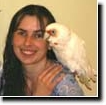Lowering the pH of the Drinking Water for Gouldians
& Other Finch Species
Kristen Reeves, Meadowlark Farms Avian Supply, Inc.
There has been a lot of discussion about whether probiotics are necessary for Gouldians and other finch species. After reading Dr. Rob Marshall's "Sterile Bowel Theory" and testing that theory for myself, I have found that Dr. Rob is on target and that probiotics are a waste of money when used on Gouldians and other finch species.
During routine necropsy of both sick and healthy birds (death by natural causes - typically old age), I've cultured and tested every portion of the alimentary canal (from beak to vent) and have found very little to no "beneficial" bacteria even in healthy birds. Not all have been "sterile" even with my exceptional care when performing necropsies to prevent cross contamination, but there has never been the large amounts of "good" bacteria I typically find in psittacines and some other passerines. This tells me that "sweetening the gut" is not a good term to use for finches. Perhaps the phrase, "allowing them to build immunity" would be better.
For Gouldians and other finch species, the benefits of lowering the pH of the water can be great.
Lowering the pH allows the bird to combat bad bacteria on its own without the use of medication. It doesn't "cure" anything, but it does allow the bird to build up immunity by killing off or slowing down bacteria and other internal pathogens, and making the drinking water inhospitable to illness causing agents.
So what is the best pH level for Gouldians, and how do we achieve that level?
I have found the best pH level to maintain healthy gut flora in Gouldians (and most other small finches) is approximately 5.3-5.5.
When attempting to lower the pH of your water - whether it be to avoid yeast in a chick's crop, or to "sweeten the gut" and tighten droppings, you first want to TEST your water to see what the pH level currently is. I use aquarium test strips to do that here. The normal pH of your water will depend on your water source and may vary greatly if you have a well. Be sure to TEST your water before adding a lowering agent.
My city tap water ranges from 7.0-7.2. At that level I need to add the following to lower the pH to 5.5:
- 1/4 tsp MegaMix (liquid citric acid) per quart of water - OR
- 1/4 tsp of CA (citric acid in crystal form) per quart of water - OR
- 1/4 tsp Unpasteurized Apple Cider Vinegar per quart of water (it MUST be unpasteurized to be effective) - OR
- 1/4 tsp KD Cleanser per quart of water (should never be mixed with any other supplement or medication)
Once you test your water, you'll then add the appropriate amount of CA (or one of the others) to lower the pH. When I test, I measure 2 cups of water and add 1/8th tsp at a time, mix well, then RE-TEST to see how much the pH has changed. I continue adding until I get the level I desire and RECORD the amount I had to use for future reference.
When would we use this treatment?
- Whenever the humidity is high in the aviary (anything above 55%)
- Whenever droppings become wet and runny or very loose
- At the first signs of illness - fluffing, sleeping more than normal during the day, sitting huddled
- During breeding when you see signs of air in the chicks' crops
- During breeding when you see signs of yellow, wet, or smelly droppings in the nest
The biggest issue is making sure there isn't so much that it totally changes the taste of the water. If you've had to add too much, the birds may not drink it - which would defeat the purpose!
In my avaiary, I do NOT use CA, KD, ACV or MM every day of the week here because MY birds don’t need it. I really only use it when I see a problem. I want my birds to become accustomed to the higher than normal humidity in my aviary and the regular untreated water so that if and when they are sold or go to another home, the new owner doesn't have to pamper the bird. I want them to be able to go to a buyer without having been "babied". They should be able to combat issues WITHOUT the use of a pH lowering agent, and should only need it on rare occasions. Mutations, however, will often need it several times per week or even daily. I do what it takes to keep them healthy and let buyers know what I’ve been doing so they can duplicate my system in their own aviary.
I DO give them KD once per week as directed by the Marshall schedules and I will occasionally use the MegaMix (or CA, ACV) when not prescribed as part of the program. I watch the droppings - when they become wetter than normal, I add the CA (in whatever form). But you MUST know what normal droppings look like for YOUR birds. Consistency will depend on environment and what you are feeding them. If you are feeding fresh greens, chitted or sprouted seed, or wet soft food, their droppings will be wetter by default. If they are on a plain seed diet with nothing more than water supplements, their droppings should be well-formed, tight and dry.
Birds who do not have a wet diet may have a small wet ring of urine around their droppings, which is perfectly normal. If they are receiving supplements in their water, the color of the urine or the urates may be slightly tinted yellow from the supplements - this too is completely normal.
LEGEND:
CA = Citric Acid. Please keep in mind - Citric Acid is NOT Vitamin C like some folks seem to believe. Vitamin C is ascorbic acid. Sure, the birds need Vitamin C, but it is not as effective at lowering pH as Citric Acid.
ACV = Unpasteurized Apple Cider Vinegar. Unpasteurized means it still has the "Mother" in it. The Mother is that nasty blob in the bottle of the container. ACV also has other health benefits. It is an effective, natural, bacteria-fighting agent that contains many vital minerals and trace elements such as potassium, calcium, magnesium, phosphorous, chlorine, sodium, sulfur, copper, iron, silicon and fluorine that are vital for a healthy body and gut. Simply put, it's a natural form of probiotics that also includes bodily salts. For birds who require probiotics for whatever reason, ACV is the easiest way to dose them while ALSO lowering the pH of the water.
MM = Dr. Rob Marshall's Mega Mix. It is Citric Acid in liquid form.
KD = Dr. Rob Marshall's KD Cleanser. This is NOT a form of citric acid and should only be offered 1 or 2 days per week, MAX. However, it is one of those items I will never be without in my birdy medicine cabinet. While it is not a medicine, it does help to kill bacteria and flush it out of the system. It is especially effective on yeast (Candida). I've used KD to save many a chick from the dreaded ballooning crop, and many adults with severe enteritis. It is my first line of defense when I sense there is something amiss - BEFORE using any sort of medication.





